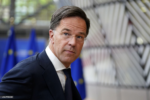Georgian President Salome Zourabichvili announced on Sunday that she does not recognize the results of the parliamentary elections held on Saturday in Georgia. She stated that the country has been the victim of a Russian special operation.
European observers also reported that the elections were conducted in a “divisive” atmosphere with widespread threats and instances of physical violence, undermining the results. Georgians were expected to decide whether the country would continue on the path to European Union membership or fall further under Russian influence. The Central Election Commission announced that the ruling party, Georgian Dream, secured 54.8% of the votes, with 100% counted. Local observers also reported numerous violations, stating the results “do not reflect the will of the Georgian people.”
Observers from the Organization for Security and Cooperation in Europe (OSCE) stated on Sunday that an uneven electoral playing field in terms of funding eroded trust in the results and raised questions about the fairness of the elections.
“Reports of voter pressure, especially among public sector employees, were widespread in this campaign. This, along with the extensive tracking of voters on election day, raises concerns about some citizens’ ability to vote without fear of punishment,” said OSCE Special Coordinator Pascal Allizard.
OSCE officials also observed instances of vote-buying and double voting, especially in rural areas.
On Sunday, the Central Election Commission announced that the ruling Georgian Dream Party had secured over 54% of the votes in Saturday’s parliamentary elections, a result contested by the opposition.
On Sunday, leaders of two opposition parties, Tina Bokuchava and Giorgi Vashadze, stated they would not accept the results and announced, among other actions, the organization of protests.
“The elections were stolen by pro-Russian oligarch Bidzina Ivanishvili, and we, the National Unity Movement, will not accept them. We are here with the president to consult and will continue intensive consultations. I hope the pro-Western democratic opposition will unite,” said National Unity Movement leader Tina Bokuchava.
Giorgi Vashadze, leader of the Strategy Builder party, echoed this stance.
“Our position is that protests are essential; we must show that we are more than they are,” he said.
Bokuchava and Vashadze made these remarks following a meeting with the country’s president, Salome Zourabichvili.
The outcome is seen as a setback for pro-Western Georgians, who viewed the process as a choice between the ruling party, which has deepened ties with Russia, and the opposition, aiming to accelerate European integration.
ISFED, a local monitoring group, reported procedural violations, including ballot box stuffing, bribery, and voter intimidation, which it said may have impacted the outcome.
Representatives from the group stated that they observed no fundamental violations in the vote-counting process, most of which was conducted electronically.
The Electoral Commission and Georgian Dream party maintained that the elections were free and fair, declining immediate comment on the opposition’s allegations.
“The fact that the same party can achieve such success in such a challenging situation is a strong indicator of the talent of the Georgian people,” said Georgian Dream founder and billionaire Bidzina Ivanishvili on Saturday.
The election results have caused a divide among Georgians.
“I’m not completely satisfied that certain parties won parliamentary seats. However, I don’t believe the situation will worsen beyond what it already is,” said Tbilisi resident Vahtang Magradze.
“I would have preferred the votes between the ruling party and the opposition to be more balanced; it would have been better for us. But it seems things will continue as they are. I don’t expect anything positive,” said another Tbilisi resident, Vazha Pophadze.
“The main thing is peace, and there’s no need to fight among ourselves. It’s necessary for the nation to unite and for everyone to be happy. We don’t need to insult each other,” said a Tbilisi resident known only as Mamuka.
“The opposition acts as if it doesn’t believe in itself. I think not all hope is lost, nor that we’ll wake up tomorrow as Russians. Much will have changed by the next elections,” said Saba Prunidze, a Tbilisi resident.
Georgia was once one of the most pro-Western states to emerge from the chaos following the Soviet Union’s collapse.
Since Russia’s invasion of Ukraine in February 2022, Tbilisi’s relations with the West have weakened. Unlike many Western allies, Georgia refused to impose sanctions on Moscow, while the rhetoric of ‘Georgian Dream’ has become increasingly pro-Russian.







